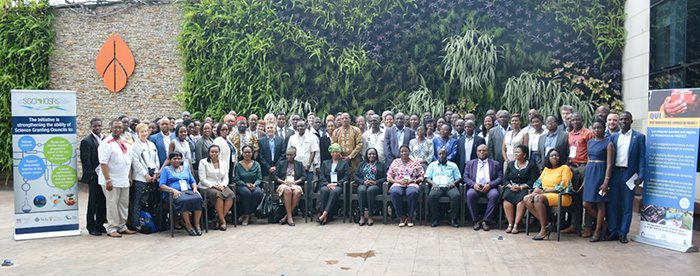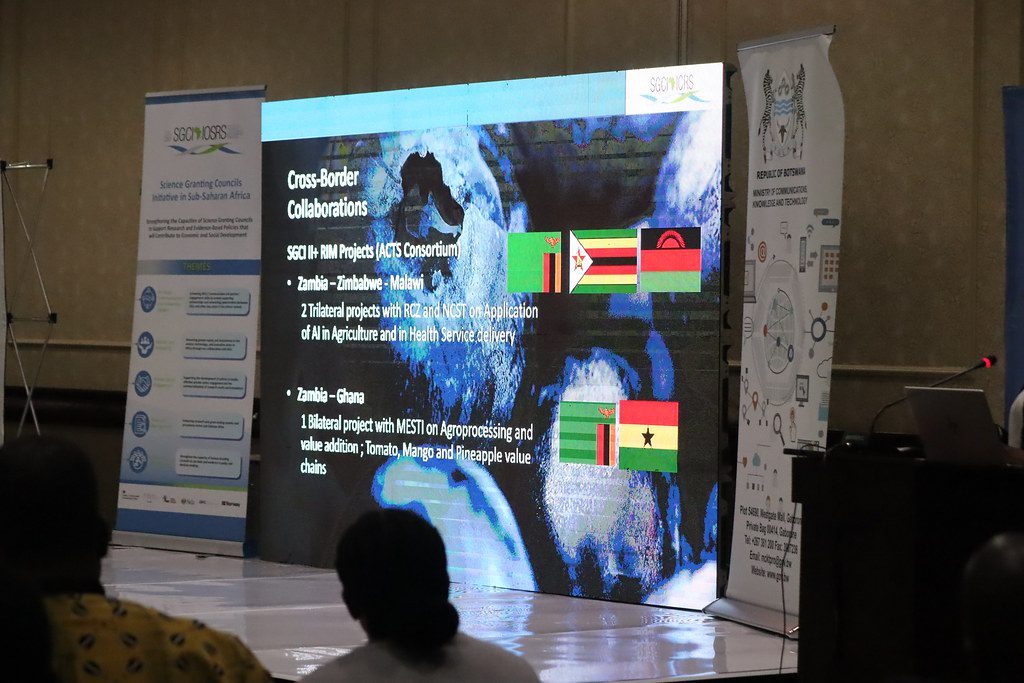SGCI News
Science is not just about discovery, it’s about impact, and SGCI is helping to make this difference happen. The Science Granting Councils Initiative (SGCI) is enabling researchers across Africa to…
Science is not just about discovery, it’s about impact, and SGCI is helping to make this difference happen.
The Science Granting Councils Initiative (SGCI) is enabling researchers across Africa to break down obstacles and transform ideas into life-changing solutions.
From transforming agricultural practices in Namibia to developing life-saving technologies in Nigeria and enhancing baking standards in Uganda, we are seeing how funding from SGCI funding is making a great difference.
Here are three stories from three councils reflecting the remarkable innovations researchers are coming up with and how these innovations are impacting in the lives of people and communities across Africa.

Namibia’s Professor Chimwamurombe’s vision for sustainable agriculture
In Namibia, farmers using traditional methods frequently struggle with climate change and poor soil health.
Professor Percy Chimwamurombe of Namibia University of Science and Technology recounts how SGCI funding revolutionised their agricultural research.
“The support from the SGCI enabled us to develop five biofertilisers,” he explains.
“This directly benefited thirty communal farmers, improving their yields in key crops like cowpeas, pearl millet, and bambara groundnuts.”
His testimony underscores how SGCI funding empowers researchers to address critical local needs.
“We’re also training the next generation of biotechnologists and developing protein-enriched pearl millet flour to combat malnutrition,” Chimwamurombe says.
His team is helping to strengthen food security by implementing findings from evidence based research into the real world.
Nigeria’s Professor Nwaugo’s efforts to turn his research into life-saving innovation
Research in Nigeria, a lot of the times, is limited to scholarly journals.
Professor Victor Nwaugo of Abia State University, shares how he’s changed his approach with the support of SGCI.
“SGCI funding has given us a new purpose,” he states.
“Before, we were primarily focused on publishing research. Now, we’re driven to create solutions that impact society, like our biosensor device for water purification.”
Nwaugo’s team is actively working towards commercialising their innovation, a testament to the practical outcomes of SGCI support.
“Without SGCI, our work would have remained on paper,” he acknowledges.
“They’ve given us a platform to make a real difference.”
Uganda’s Professor Muyanja’s drive to improve bakery standards
In Uganda, many bakers lacked the knowledge and resources to meet quality and safety standards—until Professor Charles Muyanja from Makerere University stepped in and plugged critical knowledge gaps with an SGCI-funded project.
“Our project aimed to improve compliance and enhance the skills of bakery personnel,” he explains.
Muyanja says by engaging extensively with key industry players, he and his team created straightforward standards for bread and cake production.
The impact? A safer, more competitive baking industry where businesses can thrive, and consumers get better-quality products.
“SGCI funding helped us bridge the gap between research and practical application,” Muyanja says.
He says bakery workers now have the tools they need to meet high standards and grow their businesses.”
Impactful work
SGCI is driving sustainable development and creating opportunities for communities across Africa.
These projects highlight how SGCI-backed research is making a difference. As more researchers receive support, their work continues to drive real change across Africa.
Let’s continue the conversation on our social media. Follow us https://x.com/SGCIAfrica
Related News
How Zambia’s science council is funding research that matters
When Zambia’s National Science and Technology Council (NSTC) was established in 1997, its founding vision was to harness science, technology, and innovation to improve the lives of ordinary Zambians. More than two decades later, that vision is increasingly taking shape through a growing portfolio of…
Voices of SGCI: Council leaders on the direction and ambition of SGCI 3
At the African Union’s Science, Technology and Innovation Week in Addis Ababa, earlier this month, leaders of science granting councils reflected on what SGCI Phase 3 represents for Africa’s science and innovation systems. From ownership and alignment to stewardship and sustainability, here are their voices…
Building Africa’s science future: inside the SGCI alliance
As Phase 3 of the Science Granting Councils Initiative launches on the margins of the African Union Summit in Addis Ababa last week, the SGCI Alliance Chair explains why this moment marks a decisive turning point for African science. Cephas Adjei Mensah describes what is…
SGCI funded projects
Rwanda’s integrated approach to sustainable agriculture and nutrition
Project Titles & Institution Areas of Research Number of Projects being funded Project Duration Grant Amount In-Kind Distribution Council Collaboration with other councils





